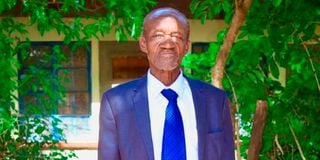Dementia: 'My grandpa spoke to Jesus and the Pope'

Zacharia Shikanda at his home in Mumias.
What you need to know:
- Dementia affects about 55 million people globally, 60 per cent of whom are from the low and middle income countries.
- A study published by the Lancet in January this year says the number of people living with dementia will triple to about 150 million by 2050.
I have glossy memories of my grandfather, neatly stashed in one corner of my brain. So bold are the recollections that when I heard that he had died, I tried perusing each of those, but I could not find one that reminded me of a day that sickness robbed him of his strength.
He seemed strong, even on a wheelchair and he often said he was okay, but was he? In the incalculable memories, there is one file that remains shadowy. The bold fact that being alive and seemingly in good health is not a guarantee that one’s health is perfect.
That old age is irreversible but it is not to blame for the ignorance that comes with diseases that can be diagnosed despite being incurable –in this case, dementia.
Search engines have an array of images for dementia, but one thing stands out: old men and women feature the most. Even the Centres for Disease Control and Prevention (CDC) has used an old man’s photo in their description of the syndrome on their site, a conclusion that ostensibly sums it as an old person’s disease. The CDC defines dementia as a general term for the reduced ability to remember, think, or make decisions. That interferes with normal daily activities.
It took two years for my family to recognise that their patriarch’s sudden change of mannerisms could actually be dementia –specifically, Alzheimer’s disease. How lucky that my grandfather’s oldest grandson is a medical doctor and after visiting him last year, he made a prognosis of his ailment based on his symptoms. He broke the news via the family WhatsApp group and that kept me wondering. How many people are suffering the same predicament but are dismissed as lunatics?
It all started with my grandfather’s clarity on the flash from the past and completely forgetting the latest happenings of his life. He unfolded the old memories like hidden treasure troves. Mostly, we dismissed him and hoped that he was joking and would be better someday.
Before I witnessed his memory loss and hallucination first hand, I could phone him via my younger sister’s phone and he seemed uninterested in the guise that he did not know who I was. His attitude towards me piqued my journalistic curiosity, and I started conducting research and shared it with my father. He, too, did not comprehend my understanding of dementia and he often said “let’s pray for him, he will be okay.”
My sister’s tell-tales of my grandfather seemed fictional. I often laughed it out; regrettably. That the old man believed my grandmother, who died almost a decade ago, was alive and lived with him.
That some ‘fictional’ people were after him and he always had a rungu just in case they attacked. That his mother was alive. That his deceased brothers and sisters had visited him and they were having a good time under the shade of the mango tree outside his house. That he was an altar boy conducting mass in Latin with the missionaries.
One time, when he went to the bank, cons robbed him of his bicycle –his longest possession that he held so dear. He often got into accidents with his bicycle, I wonder if that was as a result of a hallucination while on the road.
It was until I witnessed the change of his way of life first-hand that my heart broke. As is the norm, every time I got to the village, the first thing after dropping my bags in our house was to go to my grandfather’s place to announce my presence.
He would smile, broadly, exposing his not so perfect dental formula and he would say his almost predictable words; “You look like you just landed from Rome. You are dressed like Michelle Obama and you have grown tall, thank you for visiting kuka. So, what gift have you brought me? How did you do in school?” He always had something amusing to say. Even when he was affected by dementia, he did not fall short of such beautiful words to welcome home her granddaughter.
It was until he asked me who I was that I knew he needed urgent help. I tried explaining to him but all he thought of was his mother-in-law, who I was named after. He asked me about people I had never heard of and when I inquired from my father later on, he told me all those people he mentioned were dead or were his long lost friends. Even after telling him countless times that I completed university, he still asked me how my exams were and when I would finish school.
In one of my frequent visits to his house last year, I found him speaking to a portrait of Jesus and the Pope, so he asked me to join him. While I found that unusual, I complied and he introduced me to ‘Pope’ as if he were there with us physically. He went ahead and asked me to tell the Pope who I was –I did. We then moved to Jesus’ portrait, where he recounted stories from a conversation that he had with ‘Jesus’ earlier.
As a staunch Catholic and catechist par excellence, he had lived all his life as per the confines of the church doctrines. He went to church every Sunday morning until dementia robbed him of his usual routine. He would now go to church at odd hours, like 2pm when the house of God only had benches and quiet serene inviting the presence of God. Sometimes he could attend all the church services in a day and people started looking at him with a judging eye.
My aunt Perpetua in one of her visits home was dejected that grandpa had lost his senses but she stayed even closer.
“Today I looked at dad and wondered quietly how fast things change in this world. Where has his mind gone? He loved the church but nowadays he doesn’t go. But I have noticed that when we pray, he joins in the prayers as well,” she posted in the family WhatsApp group.
My cousin, Dr Marvin Omingo, advised us how to take care of him in that situation, acknowledging that most families will likely feel overwhelmed and frustrated.
“I know it can be very difficult, but take heart,” he said
He then quoted a study on dementia that said; ‘hostile responses on the part of the caregiver can be counterproductive and sometimes harmful to the patient. Reassurance and distraction and calm positive statements are more productive.’
All hope was pegged on the caregivers and the available family members in the village. The caregivers he had were passionate and dedicated to their work and always reassured him even when he said things that did not make sense.
The undertones in my village was that he had run mad, or someone had bewitched him –showing the unfamiliarity of the disease in my village, and probably in the country. A man who wore suits every day of his life started finding comfort in track suits and t-shirts. A man that I knew loved grooming could stay weeks without having a clean haircut. He found delight in sandals, not his squeaky clean black closed shoes. Before dementia, he could walk with his briefcase with his Bible in-it, but afterwords, he sometimes walked with a rungu.
My grandfather unfortunately died before taking any treatment that would help in managing Alzheimer's disease. In his sunset days, he fell and fractured his bones, which bore a series of complications adding on to the dementia. He then had surgery and survived. Later, pneumonia took a toll on him and he died on a Saturday when I was on my way to visit him, to listen to his old tales one more time.
Researchers from the Aga Khan University in collaboration with Davos Alzheimer’s Collaborative will be conducting the first clinical trials of dementia in Kenya this year to address the longstanding lack of diversity in Alzheimer’s research with the aim to improve care, and increase access to future innovative treatments throughout Africa.
Lead researcher, Dr Zul Merali, told Healthy Nation that the study is aimed at building a model for all the low and middle income countries.
“We believe that people across the globe should have access to innovative treatments – and right now, the most innovative treatments for Alzheimer’s are in clinical trials. Nearly zero Alzheimer’s treatments have been tested in Africa and there has never been an Alzheimer’s clinical trial in East Africa. We wanted to change this,” says Geroge Vradenburg, founding chairman of the Davos Alzheimer’s Collaborative board.
"Further, innovative practices developed in lower-middle-income countries have the potential to transform trials in high income countries as well."
The scientists are optimistic that the new study will help in developing new forms of treatment.
“Several promising drugs will be submitted to the Food and Drug Administration in the next six to 12 months. One of the aspects fuelling our optimism is that biomarkers and other tools for detection and diagnosis are improving rapidly. This will speed research in ways that were unimaginable in the past,” the scientists say.
Explaining why there is still no cure for Alzheimer's despite it being in existence for some time, the researchers attribute it to the complexity of the brain.
“The brain is very complex. And since we haven’t been doing clinical research and trials on the population at large, only a segment of the population, that does not help.”
However, there is emerging evidence that lifestyle modification could play a role in prevention of disease and/or slowing down the disease course. The researchers say nearly half of the risk factors for Alzheimer’s disease are modifiable, including diet, exercise, not smoking, among others.
What you need to know about dementia.
The World Health Organization says dementia is not a disease but a syndrome which is characterised by the loss of the cognitive function of the brain and causes diseases such as the Alzheimer’s disease (the most common), vascular dementia, frontotemporal and dementia with Lewy bodies
It affects about 55 million people globally, 60 per cent of whom are from the low and middle income countries.
A study published by the Lancet in January this year says the number of people living with dementia will triple to about 150 million by 2050.
The US Food and Drug Administration (FDA) approved a new Alzheimer’s drug called aducanumab after an 18-year hiatus.
There is no cure for dementia at the moment and it can only be managed based on symptoms.
Early symptoms of dementia include forgetfulness, losing track of the time and getting lost in familiar places.
Middle symptoms of dementia include forgetful of recent events and people's names, confusion, difficulty with communication, needing help with personal care, behaviour changes and repeated questioning.
Late symptoms of dementia include becoming unaware of time and place, difficulty recognising relatives and friends, increasing need for assisted self-car, difficulty in walking and aggressiveness.
Age increases the risk for dementia but there are studies that show that dementia may start at an early age; a phenomenon called young onset dementia. It is important to note that not all old aged people will have dementia, some can live all their lives without any signs of dementia.
It would cost over Sh200 trillion to manage dementia globally by 2030: Source: WHO, CDC, Global Dementia Advisory.




